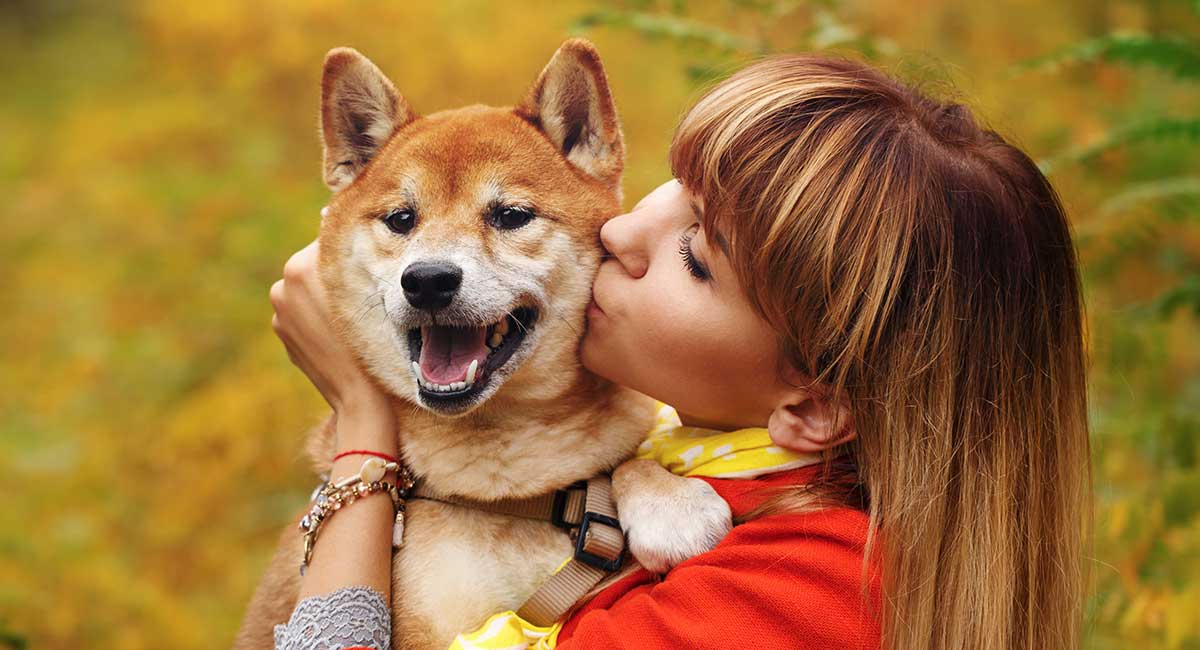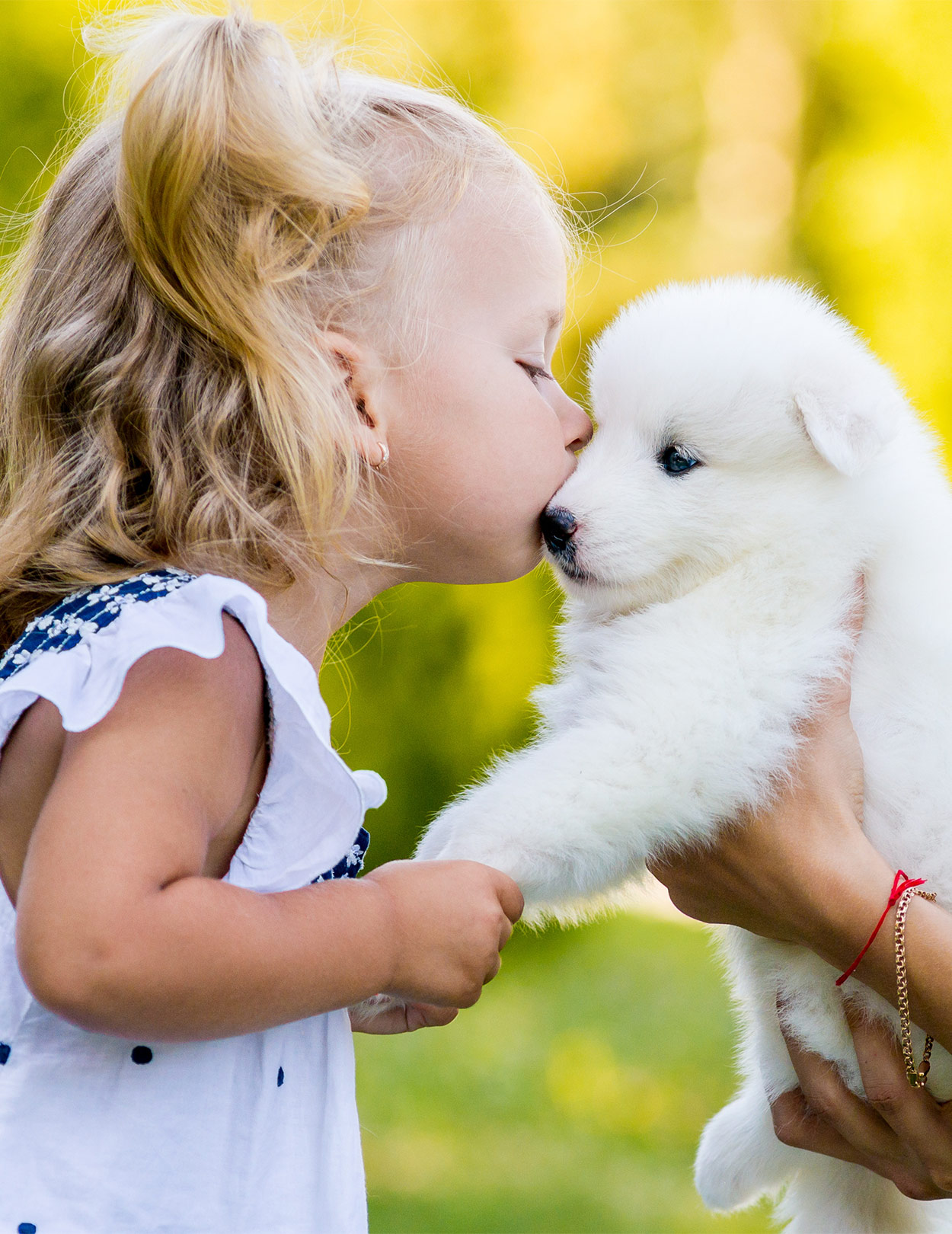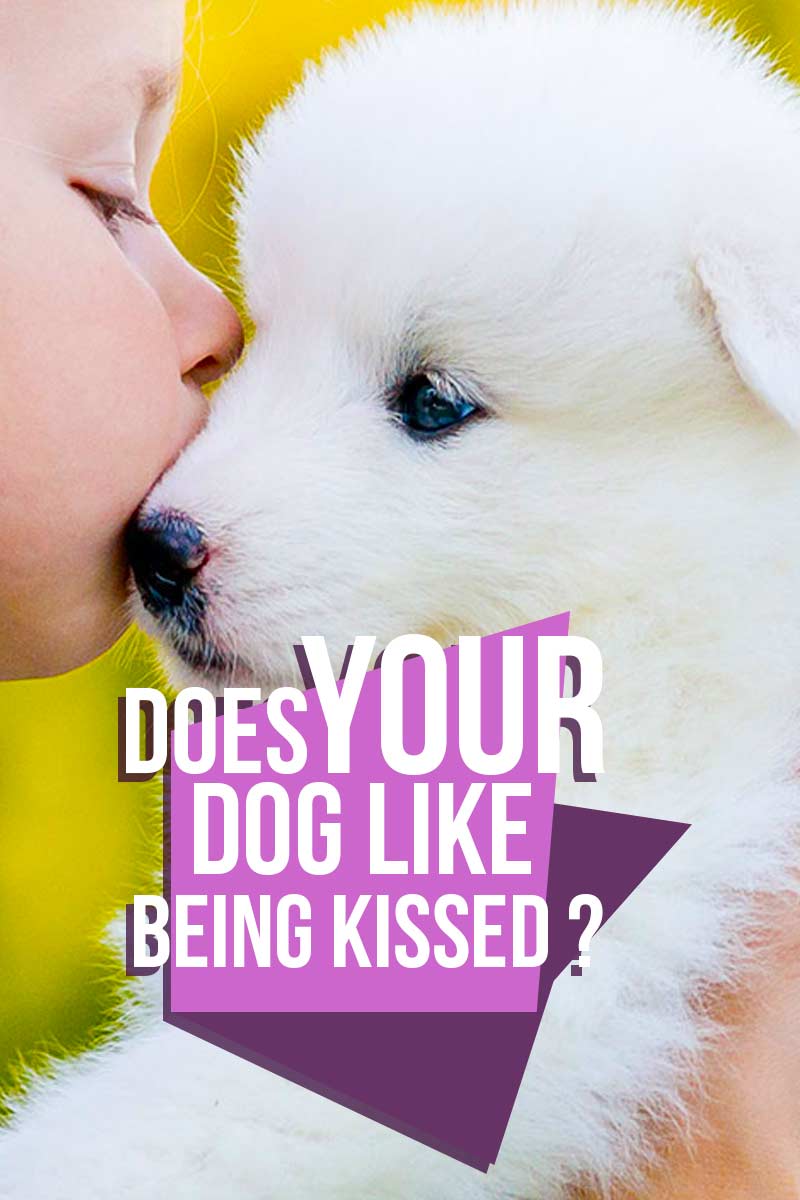Can I kiss my dog

Can I Kiss My Dog? Is It Okay To Kiss Dogs And Things To Consider About Puppy Kisses
Parasites are also nota big health risk, as transmission is possible but very unlikely. In fact, most bacterial and parasitic infectionsthat do occur are via a fecal-oralroute. This means that yourpup would have to lick or eat his own oranother dog's feces and then lick you for a potential transmission. Furthermore, most parasites need to mature to become infective,soit would've had to befeces that was more than a day old. Viruses, on the other hand, tend to not be transmissible between canines and humans with the exception of a few (such as rabies).
Behavioral Considerations
You'll also need to take into account your dog's behavior. Many dogs don't likehugs, but do they like kisses? Kissing is not a natural behavior for dogs, but rather a learned one. It can also bea sensory one,which simply means youhave a scent or tasteon your face that they want to explore. The behavior that most resembles kissing for dogs is whenthey lick each other's faces. Butthat's usuallyto indicate a desire to play or submissive social status.
The best way to determine if your dog likes kisses is to observe his or her behavior.Your dog is likely okay with kisses if he or she stays relaxed and comfortable,does not change the position of theirtail, has perked-up or relaxed ears, or even leans in. On the other hand, any signs of distress or discomfort means your dog doesn't like kisses. These signs include tensing up, pulling back, looking away, ducking, dropped or tucked tail, pinned back ears, growling, baring teeth or other signs of anxiety. In these cases, the decision is easy and it's best to find another way to show affection to your dog.
The Verdict?
As long as your dog enjoys it,it'strulypretty safe kiss your dog. The only reservation you may have is knowing that your dogcould have been nose-deep in something unpleasant.However, even that won't stop some of us from getting in our puppy kisses.
How Unsanitary Is It to Kiss Your Pet on the Mouth?
The PLOS One study also suggested that frequent tooth brushing would likely remove most pet bacteria that got transferred into human mouths anyway. But lets say some stubborn germs stuck around. Could they make you sick? Unfortunately, its not impossible.
The risk of infection
Zoonotic diseases are here to rain on your pet-kissing parade. These illnesses can be transmitted through viruses, bacteria, parasites, and fungi that pass between animals and humans, according to the Centers for Disease Control and Prevention (CDC). One of the major modes of transmission is coming into contact with the bodily fluids of an infected animal, which in some cases could be a dog or cat. Lovely.
Many headline-making zoonotic diseases, like avian flu, are transmitted through animals that humans are less likely to keep as pets (although if youre lucky enough to have a coop of chickens, were intrigued). However, cats and dogs, including ones that appear perfectly healthy, can also carry germs that may spread to people and make them sick.
This is generally rare, according to the CDC, partly because when you touch your pet, its usually with intact skin such as the palm of your hand. Most of the germs found in our pets mouths are unlikely to cause any problems this way, Leni K. Kaplan, D.V.M., a professor at the Cornell University College of Veterinary Medicine, tells SELF.
Contact with your mouth, nose, and eyes is of greater concern. The permeable mucous membranes in these areas are more vulnerable to absorbing germs from your pet, Mia L. Geisinger, D.D.S., associate professor and director of the Advanced Education Program in Periodontology at the University of Alabama at Birmingham School of Dentistry, tells SELF.
This type of contact can happen indirectly, like if your sweet dog licks poop off its butt then licks your hand, and you use that hand to rub your eye. Hence why the CDC advises thorough handwashing after coming into contact with cats and dogs, as well as their bodily fluids like their saliva and poop.
This kind of contact can also happen directly, like when you kiss your cat or dog on the mouth because come on, look at that face! Outside of being a little bit gross, you can definitely see disease transmission, Garner says.
What you could (theoretically) catch
There is a wide variety of illnesses you could possibly get from kissing a cat or dog on the mouth. But if you were to catch anythingwhich, again, is rareit would probably be an unpleasant (but usually not too severe) gastrointestinal illness, Garner says.
For instance, the CDC notes that campylobacteriosis is one of the most common infections humans can get from cats and dogs. The offending bacteria, Campylobacter, can be transmitted via the stool of an infected animal who may or may not appear sick. (And, as we discussed, cats and dogs are quite devoted to licking their own butts, so they tend to have feces particles in their saliva.) Campylobacteriosis can cause diarrhea, stomach pain, and fever in humans, the CDC says.
Do Dogs Like Kisses? What Your Pets Behavior Might Be Telling You

We kiss and cuddle to show affection and naturally we want to do the same with the dogs we love. Yet kissing is not a natural part of doggie behavior. When dogs lick your face back, this isnt always a sign of returning affection. Dogs licking can mean many things from showing affection and relieving stress, to showing submission. Lets take a look at whether kissing your dog is sending them the right message, and what your dogs smooches in return might really mean.
Do Dogs Understand Kisses?
Dogs and humans communicate in completely different ways. Unfortunately, we often make the mistake of interpreting dog behavior in human terms. Humans rely on verbal or sign language to express ideas and emotions. Dogs primarily depend on body posturing and facial expressions to communicate with each other.
Researchers have studied dogs for years to try and understand them better. Its tempting to compare dogs to their wild ancestors, wolves. Much like dogs themselves, though, dog language has also evolved over the 30 000 years since they started living with humans. Now researchers estimate that, amongst todays domestic dog breeds, Huskies have retained the most wolf-like language traits. German Shepherds have only retained about three quarters of wolf-like social signaling. Cavalier King Charles Spaniels have retained the least wolf-speak in the dog kingdom. These variations even make it hard for dogs to communicate with other breeds. So its no wonder that we sometimes struggle to understand our pets.
Lost in Translation
Since we dont speak dog, some of the things we take for granted can easily get lost in translation especially signs of affection, like hugging and kissing. Kissing is a human trait. Researchers have yet to find a comparable behavior in dogs that reflects the same range of emotions as human kisses.
Dogs do not innately understand what kisses mean. However, just like we learn what their different behaviors mean, dogs are also very good at learning how to interpret our behavior.
Do Dogs Like Kisses?
The act of kissing your dog means we place our faces right up against theirs. Sometimes we even go so far as to hug them, throwing our arms around their shoulders. We might enjoy this from a select number of humans. But think about the last time a relative stranger gave you a hug or a kiss, or someone tried to do this when you werent in the mood.
Dogs rarely approach each other straight on. Instead, two dogs greeting each other will approach from the side. Putting your face close to a dog is a very assertive behavior in dog language. If he hasnt learnt what this is all about he might feel very threatened.
Aggressive dogs may loom over more submissive dogs, trying to make themselves appear larger. In this context, it is easy to see how a dog could confuse a child leaning in for a kiss with a threat. Because dogs learn what our behaviors mean, the good news is that most dogs can learn to associate our kisses with affection. Even enjoy them reciprocate in their own way.
But Watch Their Reactions
Some dogs, however, only tolerate kisses because weve trained them to accept this behavior as normal. Others always find human kisses uncomfortable. Some find kisses downright threatening. You can usually determine whether a dog likes kisses or not by watching their reactions. Use the following signs to see if your dog likes it when you kiss them.
Dog-talk signs that a pup finds kisses stressful include turning their head away, stiffening their body, licking their lips, or yawning and even licking your face forcefully to try and make you retreat. So do dogs like kisses? They will show you!

Why Do Dogs Lick?
You may have seen dogs lick the muzzles of other dogs, or perhaps your dog licks your face on a regular basis. Is this like kissing your dog? This may feel like a kiss to us, but what is your dog actually trying to say? It can mean many different things.
Licking is one of the instinctive behaviors through which dogs communicate. Licking is often used to show affection and greeting between dogs. In fact when dogs lick themselves or others it releases endorphins the feel good hormones which relieves stress and comforts the dog. Licking is also used as a sign of submission, to explore scents, to get attention, or even as a warning to back off.
Mothers and Puppies
Do dogs like kisses from each other? The mother licks her pups not only to help them to eliminate, but also to groom and comfort them. While this is not a kiss in the same way that a human mother might kiss her baby, it is still a gesture that carries affection. As pups grow older they lick their mothers mouth. This is instinctive behavior left over from their wolf ancestry when the mother would regurgitate food.
Licking can also be a submissive behavior between dogs. A dog may lick the muzzle of a more dominant dog to avoid retribution. Or your dog could simply be curious about something another dog has eaten. But why do dogs kiss people?
Why Do Dogs Lick Your Face?
Dogs lick people for all the reasons mentioned above, and more. You should learn how to interpret the rest of their body signals to know whether its an affectionate kiss or not. Dogs are observant. If you reacted positively to kisses in the past, theyre more likely to do it again. This becomes an attention-seeking behavior, and could be your dogs way of saying, Hello, human friend, pay attention to me.
Dogs explore the world with sight, sound, smell, and taste. You dog could kiss your face simply to get more information about the delicious snack youve just eaten, or to find out where youve been. They might even lick you to draw your attention to something thats worrying them. It might be as simple as that their water bowl is empty. They could even be trying to tell you that theres something up elsewhere in the house.
An injured or anxious dog might lick a person in the same way a submissive dog licks a more dominant dog. They could be licking because they feel threatened when you, your child, or even a stranger bends over and kisses them. You might think that theyre kissing you back. In the meantime, their intended meaning could be the complete opposite and then your further approach could create a dangerous situation. So even if you believe the answer to do dogs understand kisses is a resounding yes for your own pup there are still some dangers to watch out for.
Do Dogs Know What Kisses Are?
Most dogs tolerate kisses from their owners fairly well. Some may even come to associate kisses with love and attention, and quite a few even enjoy kisses from their people. Theyll usually show their pleasure by wagging their tails, looking alert and happy, and licking you back. Unfortunately hugging and kissing behaviors are some of the most common triggers for dog bites to the face, especially with children. Every year about 400 000 children in the US are bitten by dogs. Most of the bites happen at home, to children younger than 7 years old, and with dogs that theyre familiar with.
Children are impulsive and often appear as a threat to dogs by approaching them when theyre eating. Or they might surprise them with a hug and a kiss while theyre sleeping. Children are also usually not able to interpret the warning signals when a dog doesnt want to be kissed. In some cases, dogs who are punished for growling or baring their teeth may even learn to skip more assertive warning signs. They may move straight to a nip, creating an even more dangerous situation.
Play it Safe
So its always best to play it safe and avoid kissing unfamiliar dogs. Keep this is mind especially if you adopt an older dog. You never know whether they might have been abused and have serious trust issues. Its definitely a good idea to instruct children to engage in respectful behaviors. They should wait for your dog to come to them for gentle pets. This shows that the dog is comfortable and confident with the interaction. By now you know that dogs dont kiss each other in the same way we kiss our loved ones. So, how do dogs show affection?
When Do Dogs Like Being Kissed?
When dogs have been well socialised from a young age they can come to understand kisses and cuddles as your way for showing affection. So do dogs know what kisses are? Many do and also learn to enjoy them. They may lick you to show affection back, despite it not being natural dog behavior. Your dog has learned that you respond positively to a big, slobbery dog kiss for better or for worse.
On their part physical proximity is a sign of trust and affection. When your dog is near or snuggled up to you, theyre showing that they love you. Deep sighs reveal that your dog is relaxed in your presence. Many dogs learn to enjoy pets and scratches. Just like people, dogs are unique. Some dogs express love and affection differently from others. It is up to you to observe them, and do your own research into dog behavior, to interpret their messages.

Does My Dog Love Me?
Our emotions have evolved for a reason. Love is no different. Human love is a driving force that builds bonds between friends and family and most important, helps us to support and protect one another. Dogs are social, family animals too. They share much of our genetic make up. And they also are driven to support and protect one another.
 (paid link)
(paid link) So there is no reason to believe that the emotion we call love, which powers that support and protection, feels any different to them than it does to us. And its likely that your dog does love you, very much. He or she may have different ways of expressing that love. But the underlying feelings are likely very similar.
Whether your dogs favorite way to spend time is to give you kisses or howl along to your top music tracks together, they definitely feel strongly about you.
Do dogs like kisses? Summary
Dogs do plenty of things like licking the air, which can look like cute air kisses. But do dogs like actual kisses? There is still a great deal we dont know about dog behavior. And the answer to do dogs like being kissed and do dogs understand kisses is often a no. Furthermore, dogs lick for many reasons and if your dog licks your face it is not necessarily a kiss.
Luckily for humans, dogs are pretty good at interpreting most of our body language. They know when were happy, sad, and angry. They adapt their behavior to live harmoniously with us. In turn, we teach them commands so that they can further abide by our rules.
Whether or not its okay to kiss your dog depends largely on your dog watch how they react when you when you kiss them. If there are any signs of stress, it is a good idea to respect their natural instincts and give them a little space.
If your dog seems totally unfazed, kissing is probably okay, but bear in mind that just because your dog lets you kiss them doesnt mean theyll appreciate a kiss from someone else. Most importantly, teach your own and any other children who may come into contact with your dog how to interact with dogs safely and respectfully. For more information about dog behavior, talk to your veterinarian or consult with a behavioral specialist.
